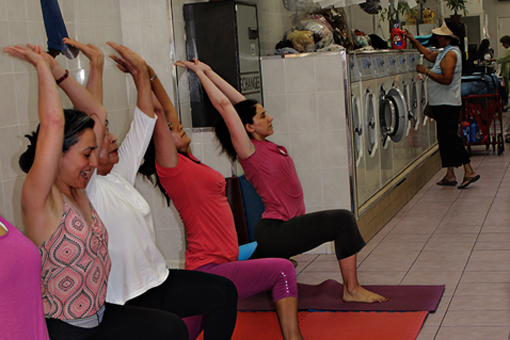A mother and child load the week’s dirty clothes into a washing machine. Nearby, a young man stuffs his dry clothes into a hamper. An old woman methodically folds children’s socks and T-shirts. It’s a typical scene at laundromats around New York City—except for one difference: while waiting for their clothes to spin dry, a handful of neighbors are learning how to make batik-dyed T-shirts with a local artist.
This facility happens to be one of a dozen coin-op washaterias participating in The Laundromat Project, a not-for-profit enterprise that blends art and community spirit with the most ordinary of household chores. Its tagline: “wash clothes, make art, build community.”
Since 2006, The Laundromat Project has commissioned 27 public art projects in 23 laundromats.
“We’re working in communities of color, we’re working in communities living on modest incomes, people whose innate creativity is not being nurtured or seen as any kind of an asset,” explains Kemi Ilesanmi, who joined The Laundromat Project in 2004 and is now executive director.
The moving force behind the idea was Risë Wilson, now 37, who left a promising career in the corporate sector to pursue her vision of bringing “art-making down to earth.”
Despite early exposure to the arts while growing up in Philadelphia, Wilson never considered becoming an artist. “As a post–Civil Rights baby, the tacit message I had retained above all was that making good on the sacrifices of my forebears meant ‘getting a good education that would lead to a good job,’” Wilson says.
The Laundromat Project’s flagship program, Create Change, asks artists to develop socially engaged public art projects in local laundromats during six-month residencies. The projects are selected by a panel that judges them on both artistic merit and their potential for meaningful local impact. The Laundromat Project receives funding from private foundations and individuals, public agencies like the National Endowment for the Arts, local arts councils, and revenue from art sales and fees.
Watch an exclusive interview with the founder of The Laundromat Project, Risë Wilson.
Reflection on a community’s past, present and future is a common theme for many of the projects. In 2007, for example, artist Sarah Kolker hosted regular workshops at The Laundry Room, asking her young Harlem neighbors to write their visions for their neighborhood in 30 years on ceramic tiles. Neighbors then created mosaics with the tiles, covering two benches outside the laundromat.
Other artists address specific community needs. Micki Wantanabe Spiller’s project responded to public library budget cuts affecting her neighborhood in Queens, and involved creating a hand-illustrated book about her neighborhood, building a book cart for her laundromat and organizing local storytimes.
Hector Canonge transformed his laundromat in the largely Hispanic neighborhood of Inwood into “The Inwood Laundromat Language Institute,” offering free English lessons to his neighbors.
In Mott Haven in the Bronx, Hatuey Ramos-Fermín and Elizabeth Hamby turned a laundromat into a classroom and asked neighbors to develop ideas to increase access to green spaces and the Bronx waterfront.
The Laundromat Project also offers extensive training to artists. “We’ve learned that just because artists are interested in doing this work doesn’t mean they are equipped to do it well,” says Ilesanmi. Monthly workshops focus on community organizing, communication skills and fundraising.
As a result, the participants become part of a network of socially active artists who continue to support one another and local communities. One multimedia project, “Housing Is a Human Right”—launched by multidisciplinary artist and activist Michael Premo at the Wash and Play Lotto laundromat in Brooklyn’s Bedford-Stuyvesant neighborhood—developed its own website and now documents housing rights issues around the world.
Today, Wilson says, the local laundromat is much more than a place to wash clothes: it’s a place where neighbors meet and interact. “Some of the projects we’ve done have just been excuses for people to stop and talk to each other,” she explains.




